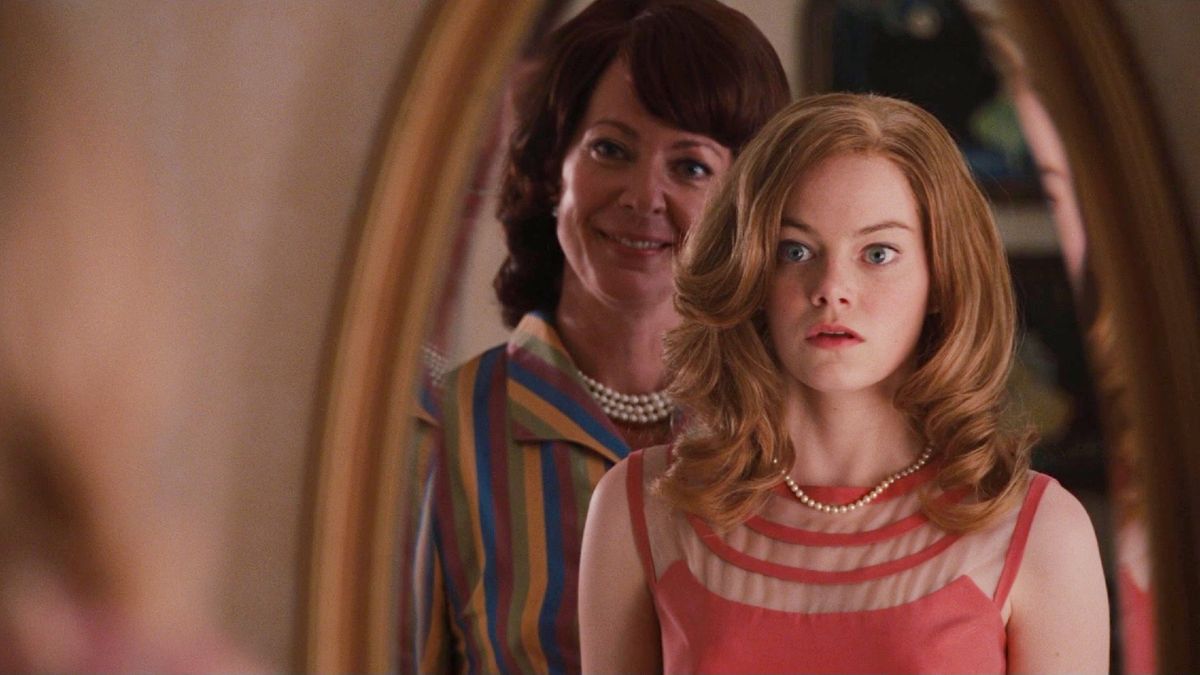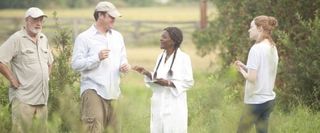The Help Director Tate Taylor Talks His Golden Globe-Nominated Hit

"It blew my socks off," says Tate Taylor of the massive success of The Help, his second-ever feature film that was nominated this morning for four Golden Globes, including Best Picture, Drama.
I was lucky enough to visit the set of The Help in August of last, where director Tate Taylor had managed to bring a ton of A-list talent to his home state of Mississippi and talk them into shooting a movie in 100 degree sweltering heat. He was bubbly and thoughtful and 100% confident in the movie he was making, and a year later it has all paid off huge. The Help is currently the #11 box office earner of the year, and even before the Golden Globes were announced today, it was a strong awards season contender with Oscar chances in its sights.
If you haven't yet seen The Help, it's now available on Blu-Ray and DVD; to commemorate that release, I got on the phone with Taylor last week to talk about the massive success of the film, how the test screening process helped him figure out how much audiences loved the movie, and how his grandmother's horrible Christmas dessert helped make The Help authentically Southern. Check it all out below; among many other places, you can buy The Help on Blu-Ray here.
As a Southerner representing this Southern film, do you feel like you have to defend the region, answer some really stupid questions about it?
Well funny enough not in the South, not from the African Americans or the whites. My mother saw this movie in Jackson, Mississippi five times, and every time it was mixed race, black white, all ages, and everyone would be in the parking lot afterwards hugging and sharing stories. That's what I know to be true. But a lot of the backlash comes from people who are academically and historically familiar with our past. I had to battle that a lot, especially being a white filmmaker and Kathryn being a white author. And my answer to that always was this. Isn't it ironic that what The Help is about is about people having the right to tell a story. And here we are in 2011, and as writers and filmmakers and even Viola and Octavia as African-American actors, the question of do you have the right to tell this story are still prevalent.
Do you think people who see the movie and get it understand that relationship between white children and the black women who raise them?
If you see on the DVD we have a roundtable discussion with some African American women who were maids then and they're children, and we talk about it, the sacrifice and struggle. What I tried to do is take out the black and white issue, take out the South. I just wanted to make these relationships, regardless of color, deep and truthful. That's really what I focused on, and that ultimately is what's relatable to anybody, whether they're in the South or not. They can see a character and go, "Oh, my God, I know them." That's what i focused on. I made Mississippi and the South a great visual backdrop, it's a historical element. I didn't want to focus on, this is the South! Of course I couldn't help it. That line when Sissy Spacek asks Minny to ask Aibleen if she's got any ambrosia, that just came to me on the set because my grandmother in Greenville South Carolina always had nasty ambrosia.
CINEMABLEND NEWSLETTER
Your Daily Blend of Entertainment News
When you guys were on the set talking about the movie and how you imagined it, you described something really similar to what the final product is. How did you keep your vision for the movie that consistent and really have the product that you wanted it to be?
I've been asked all the time about the tone and how I kept it up. You know what/ We can't help it as Southerners. It's how we talk! Pathos, humor-- it's what we Southerners do, and it comes natural. I don't know why, we just have that weird gene where we just want to hold court and tell a story.

The way the audience reacts is so important. Did you see it with audiences while you were still working on it? Did you do the test process?
It was so great. My editor and I were the only two people who had seen it. The first time I showed it to my producers, Chris Columbus and Brunson, was in front of 400 people in Kansas City. I knew it was going to be an audience experience, and I knew I wanted everybody to see my first cut with 400 people. To really feel that the story is working, or when things aren't, it's just undeniable in a room of 400.
Did you use that to change the film at all?
A little bit, but it played like gangbusters. It was the greatest feeling in the world.
This was a huge hit even bigger than people could have anticipated. Was there a point when you were surprised by how big the movie was?
I may have detached form it a little bit, because it got so big. The movie came out in August and I left the country for two months and watched it from afar. I wanted to refuel and not get swept up in it. I was in Greece and checked emails and we kept hitting these markers, and it was pretty remarkable. I was kind of glad not to be here, like "I don't want this to affect me, I want to keep telling stories the way I do." Absolutely, it blew my socks off.
Staff Writer at CinemaBlend
Most Popular





